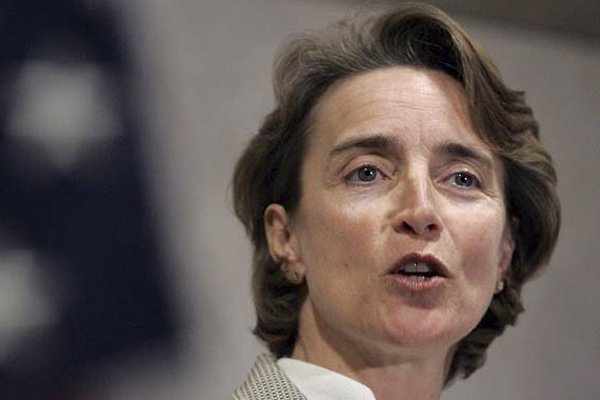WASHINGTON — Waiting to take off on a flight back to Arkansas after two hours of sleep following a night of negotiations on a major financial overhaul bill, U.S. Sen. Blanche Lincoln on Friday portrayed the compromise legislation as a big accomplishment.
Along with stricter regulation of the $600 trillion derivatives industry, the measure would set up a consumer protection agency within the Federal Reserve, prevent banks backed by the Federal Deposit Insurance Corp.from seeking profits in risky trades, and place capital and leverage limits on “too big too fail” banks.
In order to get things done in Congress, “you've got to be willing to find common ground,” said Lincoln, a Little Rock Democrat.
Interactive
http://hosted.ap.or…" onclick="window.open(this.href,'popup','height=650,width=750,scrollbars,resizable'); return false;">Financial fix?
Lincoln gave ground on perhaps the most fiercely debated proposal in the bill, one that would require banks to split off derivatives trading units into separate affiliates that are backed up, or capitalized, by separate funds - rather than depositors’ money - to ensure that trades gone sour don’t bring down the entire enterprise.
Derivatives are financial deals based on future changes in the value of an underlying asset. The deals, which are made between parties, rather than on an exchange, can be used by companies to hedge on changes in the price of commodities, such as gas or wheat, or fluctuations in interest rates, currency values or stock indexes.
Highly leveraged trading led to the demise of Lehman Brothers in 2008 and would have toppled the American International Group if the federal government hadn’t intervened.
Friday’s compromise would allow banks to continue to trade derivatives in foreign currency and interest rates. Banks would have to split off derivatives units that trade in certain other commodities, credit default swaps and equities. These derivatives trades make up only a fraction of the overall derivatives market.
Lincoln’s proposal was vigorously opposed by large Wall Street banks that make lots of profits on derivatives. Setting up more heavily regulated separate derivatives units would be expensive and could drive the derivatives market overseas, critics warned.
But Friday, even her opponent in the November election, U.S. Rep. John Boozman, said Lincoln and her foes had reached “a good compromise” that allowed banks to“legitimately use these vehicles.”
Boozman, a Republican from Rogers, said he opposed the larger bill, which he said would curtail lending.
“Lending is the lifeblood of the economy. There is so much in [the bill] that is overreaching,” he said.
After a marathon session that ended early Friday morning, the House-Senate conference committee reconciled the two chambers’ versions of the broader financial regulatory overhaul.
Lincoln stressed that the bill contains her language to require derivatives to be traded on an open exchange in most cases, with real-time reporting and using a central clearinghouse that would require traders to post collateral.
“There’s plenty of teeth left in this agreement,” she said.
The financial overhaul legislation, containing the conference committee’s compromise language, must still be approved by the House and Senate. Supporters hope to have it on the president’s desk by the July Fourth holiday.
During negotiations with Obama administration officials and House Democrats, particularly those from New York, House Speaker Nancy Pelosi of California urged Lincoln to give ground.
News of the legislation’s passage out of conference was greeted by opponents in the banking industry and on Wall Street with muted criticism and predictions that it would raise consumer costs.
Bank stocks finished the day higher, although the Dow Jones industrial average dipped slightly.
“This is a tough law that will also have profound effects on the operations and cost structure of most financial services companies and financial markets,” said Tim Ryan, president and chief executive officer of the Securities Industry and Financial Markets Association in a statement.
Ryan said parts of the bill, if it becomes law, “should help to restore and maintain confidence in U.S. financial markets.”
Some liberal groups were disappointed, saying the legislation doesn’t do enough to rein in Wall Street excesses that led to the economic meltdown in 2008. But others applauded the measure.
“This bill represents meaningful progress from the depths of our financial crisis - reforms that were unthinkable three years ago. The forces of the big banks were all aligned against Americans yet Main Street was able to win important battles,” said Heather Booth, director of Americans for Financial Reform, a liberal coalition of 250 labor unions.
In a statement, Booth pointed to greater transparency in the derivatives market and the creation of an “independent watchdog” consumer protection agency within the Federal Reserve as “landmark” achievements.
“This is a big step forward, and a first step towards the further changes we need to make sure Wall Street serves Main Street and not vice versa,” she said.
Republican conference participants unanimously voted against the bill. Sen. Judd Gregg of New Hampshire, a Republican member of the Senate Banking Committee who participated in the negotiations, said the bill was more politics than substance and would hurt families and small businesses.
“Ironically, the most remarkable feature of this supposedly comprehensive measure is its failure to substantively address the root causes of the 2008 crisis - shoddy underwriting practices and the government-sponsored enterprises, Fannie Mae and Freddie Mac,” said Gregg in a statement. “It will not encourage much-needed stability and confidence in our financial markets. It will not significantly reduce systemic risk in our financial sector.”
Fannie Mae is the Federal National Mortgage Association, and Freddie Mac is the Federal Home Loan Mortgage Corp.
Boozman echoed Gregg’s criticism of the bill. “Right now, the economy is so fragile, and I think the added restrictions will drive up costs on banks and restrict lending even more than it is now.”
President Barack Obama lauded Lincoln’s work, calling the legislation the biggest financial sector reform since the Great Depression and saying the agreement represented “90 percent of what I proposed when I took up this fight.”
Front Section, Pages 1 on 06/26/2010
